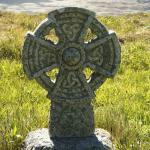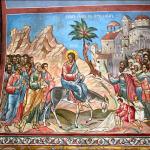All the warnings in the gospels are given, not to Those Unbelievers Over There but to the Church and, above all, to the Church’s ministers. Consider this saying:
“Let your loins be girded and your lamps burning, and be like men who are waiting for their master to come home from the marriage feast, so that they may open to him at once when he comes and knocks. Blessed are those servants whom the master finds awake when he comes; truly, I say to you, he will put on his apron and have them sit at table, and he will come and serve them. If he comes in the second watch, or in the third, and finds them so, blessed are those servants! But know this, that if the householder had known at what hour the thief was coming, he would have been awake and would not have left his house to be broken into. You also must be ready; for the Son of man is coming at an hour you do not expect.”
Peter said, “Lord, are you telling this parable for us or for all?” And the Lord said, “Who then is the faithful and wise steward, whom his master will set over his household, to give them their portion of food at the proper time? Blessed is that servant whom his master when he comes will find so doing. Truly I tell you, he will set him over all his possessions. But if that servant says to himself, ‘My master is delayed in coming,’ and begins to beat the menservants and the maidservants, and to eat and drink and get drunk, the master of that servant will come on a day when he does not expect him and at an hour he does not know, and will punish him, and put him with the unfaithful. And that servant who knew his master’s will, but did not make ready or act according to his will, shall receive a severe beating. But he who did not know, and did what deserved a beating, shall receive a light beating. Every one to whom much is given, of him will much be required; and of him to whom men commit much they will demand the more. (Lk 12:35–48).
The passage begins with a warning about Jesus coming in judgment. It is easy to read this as referring to The Day of Judgment and it certainly does apply to that as well. But it also refers to the countless little days of judgment that come–unexpectedly–throughout our lives and the life of the Church. The canonization of a saint is a little day of judgment in which we all get to hear God say, “Well done, good and faithful.” The discovery that a quiet woman who nobody thought much about gave her fortune to a homeless shelter without fanfare is a little day of judgement, not only for her, but for local biddies who gossiped about her behind her back and called her a snob because she was shy and quiet. And, of course, there are terrible days of judgment too, when the awful things we have said or done come back with terrible force. Sometimes that happens in the papers. Sometimes it happens when we are confronted by our own conscience as the cock crows. Little days of judgment happen all the time.
Notably, Peter specifically asks if the warning about the coming judgment applies to “us” or all. Who is “us?” Recall that Jesus, according Mark, always explained his parables to his apostles in private. Peter means that inner circle, the ones Jesus promised twelve crowns and twelve thrones. The ones who, on more than one occasion, took that to mean they were the Greatest in the Kingdom of Heaven and who bickered about which one would get to sit at his right hand and get Heaven’s Top Throne. The second paragraph is directed to them–and to all who would succeed them as bishops and priests.
We are now living in another little day of judgment for successors of the apostles who have fallen prey to precisely the clericalism Jesus warns against. They have eaten the sheep and gotten drunk on power and perks and they are now being surprised and robbed blind of all that by the Divine Thief in the middle of this very dark night. It is manifesting itself in the McCarrick scandal, of course. And it is manifested in the godawful findings of a Pennsylvania Grand Jury, showing some 300 priests have abused people–and been protected–over the decades by bad shepherds. That 300 priests *and* thousand documented victims (though the number actually probably runs into the thousands) reflect six dioceses going back decades.
There are 197 dioceses in the US alone.
And by “abuse” we mean everything up to and including a ring of priests who manufactured child porn. It makes you want to punch the universe in the face.
Practically everything you need to know about the wrongness of the clerical response to this is shown in this utterly typical vignette:
In another case, a priest raped a girl, got her pregnant, and arranged an abortion. The bishop expressed his feelings in a letter: ‘This is a very difficult time in your life, and I realize how upset you are. I too share your grief.’ But the letter was not for the girl. It was addressed to the rapist.
That is clericalism in chemical purity. The rapist, because he is a priest, is the one who matters. Observers will note a certain similarity to the case of Brock Turner, the white guy who raped an unconscious woman and who was called, not a rapist, but a “promising young Stanford swimmer” in the media. The thing tying it all together is privilege: who counts and who doesn’t. Clericalism constantly privileges the cleric because clericalism teaches the cleric that he is a breed apart (and above). It asserts itself in all kinds of ways.
Take, for instance, Cardinal Wuerl “laying out a plan for lay involvement” in bishop’s accountability.
Until this says, “Cardinal Wuerl meekly submits ideas to lay investigative and law enforcement personnel for their scrutiny and approval” he still is not getting it. When it comes to law and order, this is our bailiwick as laity and we are the ones with the competence and authority. We staff all the cops, run all the courts, own all the guns, and run all the jails. This is Romans 13 territory and we are talking about crime here, not about who confects the Eucharist or confers the sacrament of Confirmation. The idea that you, Cardinal Wuerl, get to plan the response and allow us–the victims and police–to be in on your plan? Thanks but no thanks. We laity can take it from here since God himself gave us the competence to do it:
Let every person be subject to the governing authorities. For there is no authority except from God, and those that exist have been instituted by God. Therefore he who resists the authorities resists what God has appointed, and those who resist will incur judgment. For rulers are not a terror to good conduct, but to bad. Would you have no fear of him who is in authority? Then do what is good, and you will receive his approval, for he is God’s servant for your good. But if you do wrong, be afraid, for he does not bear the sword in vain; he is the servant of God to execute his wrath on the wrongdoer. Therefore one must be subject, not only to avoid God’s wrath but also for the sake of conscience. (Ro 13:1–5).
People talk about bishops having “lost their moral authority”. I dissent from this view, not because I think they retain moral authority, but because I never believed they had moral authority to lose. Bishops lost their moral authority in the Garden of Gethesemane and never got it back. Saints have moral authority by virtue of their sanctity. Bishops have only the authority of the Tradition they are passing on, unless they happen, by divine Providence, to also be saints. When they parrot the Tradition, they are passing on what is holy, not because of their holiness, but because of Christ’s. You might as well call the plumbing system that delivers the baptismal water holy.
So it’s up to them to live the Tradition and if they fail to do so, they are, at best, faulty tape recorders playing back a Tradition they did not invent. St. John Chrysostom did not observe for nothing that the floor of hell is paved with the skulls of bishops. His point was Paul’s, that Jesus put the treasure of the gospel in jars of clay so that we would not make the supreme mistake of thinking the gospel was holy because of the awesomeness of its ministers and worship them as idols. The Church is holy because the Spirit is the soul of the Church, not because of its members.
Now and then, God gives us saints. Mostly, he gives us slobs and losers who are (one hopes) men on the way to holiness (a consolation to me since I am a slob and a loser who is, I hope, on the way to holiness). But our faith is in Christ, not in men.
That said, we are not talking mere fallibility or loveable doofuses like Peter here. We are talking about monstrous forms of criminality and accessories to it. We are talking about evils black as hell. We are talking about things that should send hundreds of men to jail, as well as the bishops who aided and abetted (and in McCarrick’s case, committed) these evils–and who likewise deserve jail. This is not a story about lovable chumps like Peter who fall down and get up. This is a story about monsters who destroyed people body and soul and who have done incredible harm to the faith and, far more importantly, to human souls.
That prioritization is crucial if the Church’s leaders are ever to get a friggin’ clue. It was the prioritization of “the good of the Church” over human souls that brought the Church to this pass, because it turned the clergy into the Cosa Nostra, operating under the idea that the “good of the Church” was what victims existed to protect. They and the clerical Cosa Nostra existed to service the Machine that had come to replace the living Body of Christ.
It is one of the weirdnesses of the Church that the Holy Spirit can move her to articulate profound truths while her members–including the bishops who articulate those truths–can fail to grasp them. Peter, as we shall discuss in a moment, did that. So did the bishops who rightly said in Gaudium et Spes that human beings are the only creatures in the universe God has created for their own sake. They are not means to an end and every attempt to make them that is a deep betrayal of the human person. Had the bishops simply understood that it was the victims who mattered infinitely more than “the good of the Church” and immediately acted in accordance with that fundamental truth, none of this would have happened and the offenders would have immediately been dealt with at law as they should have been. Precisely what every bishop who sought silence from victims or demanded the silence of subordinates did was turn those people–and especially victims–into means to the end of Serving the Machine. It was as vile an act of violence as if they had shot them in the head or placed them in the manacles of slavery. It will require a terrible purging, I think, before the hierarchy and all who have made excuses for this (and I number myself among the terribly guilty) see the end of the penance required. I do not think that will be in my lifetime, nor in that of my grand-children.
One thing I know: we do not need more clericalism, even when the cleric in question is a very good one. Indeed, perhaps especially when he is a very good one. Take, for instance, the crazy remarks of Fr. Thomas Rosica regarding Pope Francis.
By way of preface, let me make clear: I think the world of Pope Francis. I suspect he will be canonized–though I always hedge my bets on such things since I am leery of our celebrity culture’s habit of canonizing Folk Heroes while they are still alive (see, “Maciel, Marcial”). And precisely because I do think highly of Francis, think him a holy and good man, and, above all, think him a faithful steward of the Tradition, I think this word of praise by Fr. Rosica is barking nuts:
Pope Francis breaks Catholic traditions whenever he wants, because he is ‘free from disordered attachments.’ Our Church has indeed entered a new phase: with the advent of this first Jesuit pope, it is openly ruled by an individual rather than by the authority of Scripture alone or even its own dictates of tradition plus Scripture.
No. Wrong. Grievously and terribly wrong. The Catholic Church is not a cult of papal personality whose doctrine shifts with the whims of the pope. Jesus made certain of that by making Peter the first pope. Exactly what Paul did not do was say, “Whatever Peter feels like doing today is the New Revelation.” Precisely what Paul did do was confront Peter with the Tradition Peter himself had enunciated at the Synod of Jerusalem when he said that we are saved by grace through faith in Jesus Christ and not by works of the law (Acts 15; Galatians 2). That was the ground on which Paul stood when he chewed Peter out at Antioch for chickening out and refusing to eat with Gentiles. Peter had betrayed the Tradition he himself had articulated by the power of the Holy Spirit.
Exalting any man–even the Pope–over the authority of the Tradition is nuts. The development of doctrine is the faithful custodianship of the Tradition as it naturally puts out roots and branches like the mustard seed. That’s what Peter did in Acts 15 and that is what he failed to do in Galatians 2. The Faith is not the arbitrary wilfulness of one man decreeing according to his whims. Fr. Rosica’s analysis is absolutely insane–and everything the enemies of Pope Francis could possibly hope to hear.
And it is also, by the way, the very soul of clericalism which places the priest above the Tradition and says that whatever his whim (or appetite) desires is what God wants.
Now it is vital to understand that Fr. Rosica’s remarks tell us everything about Fr. Rosica’s own clericalism and nothing about Pope Francis. That Fr. Rosica thinks the pope can treat the faith like his personal property and plaything without regard to the Tradition in no way means Francis thinks that. Nor (attacks from his enemies notwithstanding) do I see a particle of evidence he ever has. Yeah, yeah. I know. BUT THE DEATH PENALTY!!!! Rubbish. Here’s why.
To be sure, Pope Francis has shown he is capable of clericalist responses to abuse. His initial response to the Chilean scandal was quintessentially clericalist. He blamed the lay victims.
But he also learned from his mistake and figured out what he had done wrong, returning to the matter and (with amazing speed) doing a 180 and achieving something no predecessor had done: demanding and getting the resignation of the entire Chilean episcopacy. There is something deeply Petrine in that failure and recovery. But make no mistake: the clericalism Fr. Rosica lauds was a failure, not a brilliant new advance for the papacy.
Will something like that response to the Chilean scandal happen here? Beats me. Peter has a long history of whipsawing from greatness to failure and back. We’ll see.
Meanwhile, the reality remains that the laity are no longer even slightly inclined to trust a clericalist culture to police itself. And since we are the police, judges, and jailers, we appear to be moving with all deliberate speed to undertake the investigations, arrests, trials, and jailings that are the normative way little days of judgment happen in the providence of God when the servant says to himself, ‘My master is delayed in coming,’ and begins to beat the menservants and the maidservants, and to eat and drink and get drunk.
What the bishops think about that, the laity no longer much care. But my prayer is that the ministers of the Church will undertake the project of repenting in earnest so that a day may soon dawn when the Church is cleansed of this godawful evil and figures out a system where the least of these, not their rapists, are defended and protected.
That’s going to require long-term, hands-on lay involvement–replete with cops and prisons–a prospect fraught with its own risks as the Investiture Controversy bears witness. But that’s what the bad servants set the Church up for in their sin. We’ll cross that bridge when we come to it. What is certain is that we have crossed a Rubicon and the Church in this country–and I hope throughout the world–is in for a helluva cleansing Little Day of Judgment from an ecclesial #metoo movement that cannot come a moment too soon.
Ready or not, bishops, here it comes.
Our Lady of the Assumption, Undoer of Knots, pray for us!















